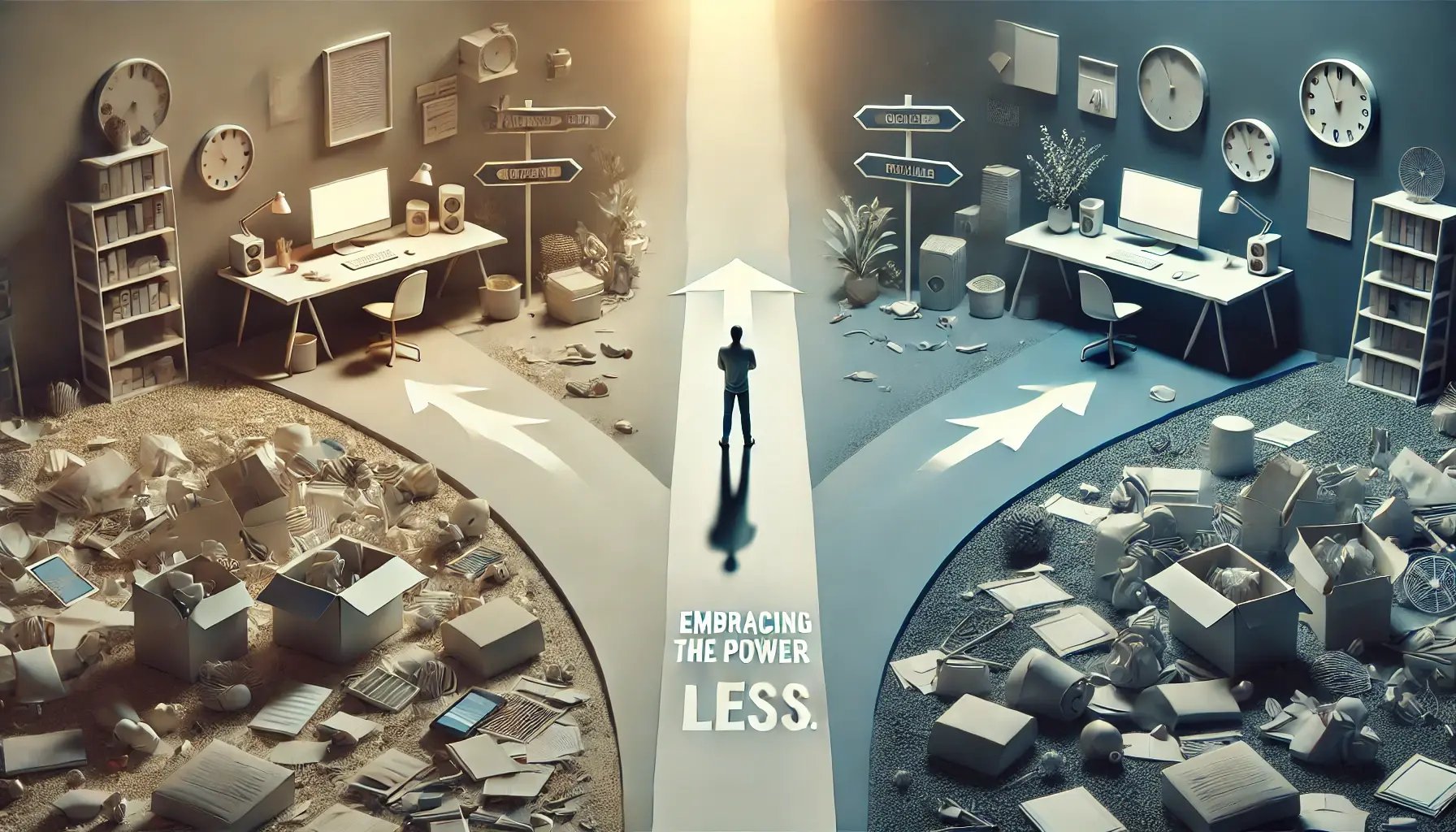Clarity. Focus. Freedom.
Smart vs. Wise: The Hidden Key to Better Decisions, Boundaries, and Success
A smart person knows what they want. A wise person knows what’s not worth chasing. Discover the power of discernment to eliminate distractions, focus on what matters, and unlock true success.
The Wisdom That Started With One Conversation
It all began with a straightforward yet impactful chat. I was talking with Jorge from my team about the difference between being smart and wise. We were knee-deep in discussions about business strategy, decision-making, and the endless stream of opportunities that come our way daily.
Then Jorge shared a thought that made me pause: “A smart person knows what they want, but a wise person knows what they don’t want.”
That line? It resonated with me. It made me reconsider everything—how we set our goals, how we prioritize, and most importantly, how we sift through the noise.


Here’s the thing: We’re often encouraged to chase more. More opportunities, more success, more goals. But what if true success isn’t about adding more—what if it’s about knowing what to let go of?
What if wisdom is not just about knowing what to pursue but having the clarity to recognize what to avoid?
That one conversation set me on a journey of exploration—transforming this idea into a resource, a workbook, and even a talk aimed at helping people sharpen their discernment and focus on what truly matters.
This ultimate guide is more than just words on a page—it’s a tool to help you cut through the clutter and start making wiser decisions in life and business.
Let’s dive in. ( Download the workbook for free! )
Sharpening Your Edge: The Power of Discernment
The Smart Plan vs. The Wise Approach
Imagine you're sharpening a blade—discernment is what keeps your edge keen in both life and business. A smart person has a plan, locking onto their target with precision. They know what they want and pursue it with determination.
But a wise person? They play the long game.
They understand that not every pursuit is worth their time, energy, or attention. Instead of just chasing goals, they filter out the noise, dodge pitfalls, and steer clear of distractions.
Intelligence vs. Wisdom: A Subtle Yet Crucial Difference
The line between intelligence and wisdom is subtle, yet it makes all the difference. Intelligence is about knowing how to achieve your desires.
Wisdom, on the other hand, is about recognizing when the pursuit isn't worth the cost. Just because you can do something doesn't mean you should.
Consider this classic example: Intelligence is knowing that caffeine boosts energy. Wisdom is choosing not to drink an espresso before bed—or put it in a fruit salad.
Knowledge alone isn't enough; understanding context and consequences is key. This concept isn't new. Throughout history, great thinkers have understood this well.
The Stoics taught that happiness isn't about having more—it's about wanting less. Epictetus famously said, "Wealth consists not in having great possessions, but in having few wants." The fewer unnecessary desires you have, the freer you become.
Eastern philosophies like Taoism and Buddhism echo this wisdom, teaching that mastering life involves shedding what doesn't serve you.
Even Socrates, a pioneer of deep thought, believed true wisdom comes from knowing what you don't know. Notice the pattern?
Modern Insights on Clarity and Elimination
Fast forward to today, and modern business leaders continue to emphasize this point. Oprah Winfrey once said, "Knowing what you don’t want to do is the best possible place to be if you don’t know what you want to do."
In other words, clarity often begins with elimination. Progress isn't always about adding more; sometimes, it's about removing what's holding you back.
So, what's the takeaway for you?
-
Chasing goals is easy.
-
Setting boundaries is harder—but far more powerful.
The real secret to success isn't just about choosing what to pursue. It's about having the wisdom to reject distractions, desires, and detours that lead you away from your true purpose.
Now, reflect on this: What distractions are weighing you down? What are you chasing that might not be worth catching?
That's where wisdom begins.

The Power of Saying "No"
In today’s whirlwind of choices, where opportunities flash before us like neon signs on a bustling street, knowing when to say “no” is a true superpower.
Modern life relentlessly bombards us with career paths, investment crazes, social invites, and digital rabbit holes.
The Art of Discernment
A smart person might try to grab as much as possible, thinking more is better. But a wise person? They use discernment to sift through the noise and focus only on what truly matters.
Discernment is about clarity—knowing your priorities and values so you can confidently reject what doesn’t align.
That might mean turning off your notifications to focus on deep work or skipping a networking event that won’t move the needle on your goals.
It’s a game of intentionality, and in the digital age, it’s a game-changer.
Science backs this up. Decision fatigue is real—our ability to make good choices diminishes with each small decision we make. Barack Obama knew this well.
“You’ll see I wear only gray or blue suits,” he said. “I don’t want to make decisions about what I’m eating or wearing because I have too many other decisions to make.”
Less mental clutter means more energy for what truly counts.
Applying Discernment in Everyday Life
This principle applies across the board. The wise say no to toxic relationships, understanding that negative energy stunts growth.
They decline commitments that only add to their schedule without adding value.
They ignore get-rich-quick schemes, favoring long-term strategy over impulsive risk.
In an era of endless notifications, wisdom might mean filtering out 90% of the emails, news, and noise to focus on the 10% that truly matter.
Shifting Your Mindset
Mastering discernment requires a mindset shift. FOMO—the fear of missing out—tricks us into believing that saying no means losing opportunities.
But the truth?
Trying to do everything ensures you do nothing well. Humans aren’t built for multi-tasking; we can only multi-switch—and that leads to mediocrity.
So, the real question isn’t “What should I say yes to?” It’s “What’s worth my time and energy?” Cutting out the clutter, the distractions, the commitments that drain rather than empower—that’s how you take control of your life.
Because every no to the unnecessary is a yes to what actually matters.

The Art of Saying No in Business
In the world of business, saying "no" is more than just a skill—it's an art form.
Great leaders and successful companies don't just focus on what they pursue; they define themselves by what they choose to reject.
As Harvard professor Michael Porter wisely pointed out, “The essence of strategy is choosing what not to do.” In a world brimming with distractions, dilution is the enemy of impact.
Strategic Focus Over Trend Chasing
While smart businesses might chase trends, eager to jump on every passing opportunity, wise businesses understand the importance of not spreading themselves too thin.
They know that doing so can weaken their brand, stretch resources, and dilute their mission.
Instead, they embrace strategic focus—dedicating time, money, and talent only to what truly matters.
Steve Jobs exemplified this principle.
He once said, “People think focus means saying yes to the thing you’ve got to focus on. But that’s not what it means at all.
It means saying no to the hundred other good ideas that there are.”
At Apple, he cut numerous projects so the team could perfect a select few—products that would go on to redefine entire industries.
Discernment as a Survival Skill
For entrepreneurs, discernment is crucial. It's easy to think that more opportunities lead to more success, but seasoned founders know better.
As one venture expert noted, “The most successful entrepreneurs I know say no to most ‘opportunities.’ Our greatest successes happened once we got clear on what we would NOT do.”
Growth isn't about doing more—it's about doing the right things. This mindset applies to all business decisions.
When hiring, wise leaders wait for the right fit rather than filling a seat with the wrong person.
In partnerships, they reject lucrative deals that don't align with their values.
In product development, they cut ideas that might be profitable but don't fit the long-term vision.
Saying no to the wrong things helps prevent future headaches and costly missteps.
Embracing the Philosophy of No!
Peter Drucker, the legendary management thinker, put it simply: “People are effective because they say no.” Some of the most successful companies thrive on this philosophy.
Trader Joe’s and Costco don't try to be everything to everyone; they offer a curated selection that keeps costs low and customer loyalty high.
🍔 In-N-Out Burger sticks to a simple menu and dominates its niche.
Even when it comes to expansion, the best businesses exercise restraint. A software company might resist the AI hype if it doesn't align with its core competencies.
A family-owned brand might refuse franchising to maintain quality control.
These decisions might seem like missed opportunities, but they're actually acts of strategic wisdom.
The Bottom Line
The takeaway? Knowing what you don’t want is just as important as knowing what you do.
Companies that master the art of saying no—protecting their brand, focus, and integrity—are the ones that truly flourish in the long run.

Embracing the Power of Less
"Less is more" isn't just a catchy phrase—it's a life strategy. By recognizing what you don't want, you unlock the true potential of productivity, focus, and personal growth.
With limited time and energy, every choice shapes our path to success and well-being.
Setting Boundaries for Success
While many set goals for what they desire—like bigger paychecks or new skills—few establish boundaries for what they don't want.
This is where prioritization and minimalism shine.
By clearing away both physical and mental clutter, you make room for what truly matters.
Effective time management goes beyond scheduling; it's about safeguarding your time. Saying no to pointless meetings and low-priority commitments respects your time.
Remember, every "yes" to something unnecessary is a "no" to something meaningful.
Two hours on an unproductive call? That's time lost from your key projects or family moments.
The Power of a "Not-to-Do" List
A "not-to-do" list is a fantastic tool.
Just as businesses define what they won't pursue, individuals can do the same. Whether it's avoiding emails first thing in the morning or declining social plans out of guilt, writing down what you refuse to do reinforces your true priorities.
This mindset also boosts goal-setting. If your aim is to write a novel this year, you might skip a time-consuming freelance gig.
It's not about devaluing other pursuits but recognizing they don't serve your current mission.
High achievers stay focused by saying no to distractions.
Tackling Cognitive Overload
Every day, we're bombarded with emails and notifications. Constantly checking your phone or dwelling on negativity drains mental energy that could be used for deep work or creativity.
Digital minimalism—cutting unnecessary screen time—helps reclaim your mental space.
Physical clutter can also weigh you down. Owning fewer, more meaningful possessions reduces stress and boosts clarity.
Consider your lifestyle choices: do you want a burnout lifestyle, or would you prefer success that includes balance and fulfillment?
Setting Boundaries in Relationships
Saying no isn't always easy, especially in relationships. But setting boundaries is crucial.
Deciding to avoid toxic people might mean stepping away from negative friendships.
Though initially uncomfortable, it leads to a healthier social circle over time. The same principle applies to habits.
Deciding not to scroll on your phone first thing or rely on junk food for lunch provides a framework for change. By eliminating harmful habits, you create space for better ones naturally.
Thriving with Productivity Systems
Productivity systems thrive on this principle. Tools like the Eisenhower Matrix or MIT (Most Important Tasks) help filter out the noise, ensuring focus on what truly matters instead of an endless to-do list.
The result?
🏆Freedom.
Knowing what you don't want—be it distractions, toxic relationships, or time-wasting habits—brings clarity. You reduce stress and channel energy into what brings you closer to success and happiness.
That's the real power of less is more.
Examples of Saying No
Some of the most successful leaders, entrepreneurs, and companies have truly embraced the power of saying no—and their achievements speak volumes.
Let's explore a few standout examples that highlight this approach.
Steve Jobs and Apple’s Focus
When Steve Jobs returned to Apple in 1997, the company was stretched thin across numerous failing product lines.
His first decisive action? Cutting 70% of Apple’s product lineup. Printers, servers, unnecessary gadgets—gone.
Jobs understood that Apple didn’t need to do everything; it just needed to excel at a few things. This sharp focus brought Apple back from the edge, leading to iconic products like the iMac, iPod, and iPhone.
As Jobs wisely put it, “Focus is about saying no to the 100 other good ideas.” The takeaway? Sometimes, success is about subtracting, not adding.
Warren Buffett’s Investment Discipline
Warren Buffett’s legendary investment success isn’t just about what he buys—it’s about what he chooses not to buy.
He remains within his “circle of competence,” investing only in businesses he deeply understands. During the late 1990s dot-com bubble, Buffett stayed out, ignoring the hype. Critics may have mocked him for missing out, but his discipline paid off when the bubble burst.
Buffett has famously said, “The difference between successful people and really successful people is that really successful people say no to almost everything.”
His strategy? Tune out the noise and wait for the right opportunities.
Trader Joe’s & Costco – Winning by Selling Less
While most supermarkets offer over 30,000 products, Trader Joe’s and Costco take a different path.
They succeed by limiting choices, stocking only high-turnover, high-quality items. This approach reduces overhead costs, eliminates decision fatigue for customers, and builds a loyal following.
By choosing not to be everything for everyone, these retailers have become some of the most profitable in the industry.
NVIDIA’s Singular Focus on AI
Unlike its competitors, NVIDIA chose not to diversify into mainstream CPUs or consumer electronics.
Instead, it concentrated on its niche: GPUs optimized for AI and high-performance computing. This focus has made NVIDIA a leader in artificial intelligence, boosting its valuation to over $2 trillion.
The lesson here? Avoid spreading yourself too thin—dominate one area instead of dabbling in many.
Personal Productivity: The ‘Not-to-Do’ List
It’s not just companies—successful individuals apply the same principle. Author and entrepreneur Derek Sivers follows a simple rule: If it’s not a ‘Hell yes!’ it’s a no.
Billionaire investor Naval Ravikant advises that the answer should probably be no if you’re uncertain about a major decision.
Even Mark Zuckerberg and Barack Obama simplify their daily lives by limiting trivial decisions like what to wear, preserving their mental energy for bigger choices.
Across all these cases, the message is clear: Success isn’t just about what you choose to do—it’s about what you choose not to do.

Sharpening Your Decision-Making Skills
Knowing what you don’t want—and acting on it—is a skill that can be honed with intention and practice.
Here are some actionable strategies to cultivate discernment in your decision-making.
Clarify Your Core Values and Vision
Start by reflecting on your top values and long-term goals. What does a fulfilling life or business look like for you? Then, identify anything that contradicts those values.
Knowing your “north star” makes it easier to dismiss options that don’t align.
Oprah Winfrey suggests that even if you don’t know exactly what you want, listing what you refuse to have is a great starting point. Try this exercise: write down roles, lifestyles, or behaviors you don’t want in your future.
That negative clarity can illuminate a more positive path.
Create a “Not-to-Do” List
Just like a to-do list keeps you focused, a “not-to-do” list protects your time and energy. This list can include personal habits (“I will not check my phone during family dinner”), work habits (“No meetings on Wednesdays”), or attitudes (“I won’t say yes out of guilt”).
Entrepreneur Barry Raber suggests making a team-wide “Won’t Do” list to keep focus sharp.
Put it in writing, revisit it often, and treat it as a shield against distractions.
Saying “no” can feel uncomfortable, but it’s a crucial skill. Try the soft no approach—“I’d love to help, but I’m fully booked this week. Maybe next month?”
Use the awkward pause. When asked for something, pause before responding to give yourself time to thoughtfully decline.
If needed, delay your response—“Let me check my calendar and get back to you.” The more you practice, the easier it becomes.
Learn from Mistakes and Successes
Every decision is a learning opportunity. Reflect on past choices—when saying no led to a great outcome or when saying yes backfired.
-
Did you ignore red flags?
-
Were there patterns?
Use those insights to refine your discernment. Seek advice from mentors and listen to cautionary tales from experienced professionals to avoid common pitfalls.
Wisdom often means passing on immediate gratification in favor of long-term success. Before making a decision, ask: “Will I still want this in a year? Does this align with where I want to be in five years?” A promotion with a pay raise might seem appealing, but if it costs you family time, is it worth it?
Learning to project forward helps clarify what’s truly important. By putting these strategies into action, you build a refined sense of what to avoid.
Start with small “no’s” and progress to bigger ones. Over time, this discernment will align your choices with your authentic self and vision for success.
The ability to say no isn’t about deprivation—it’s about empowerment. Each no to the unimportant is a yes to what truly matters.
Knowing What Not to Want
At the end of the day, success isn’t just about knowing what to chase—it’s about having the wisdom to step away from what doesn’t serve you.
Every decision, every commitment, every opportunity comes with a cost. And the people who flourish—who truly create impact, fulfillment, and lasting success—aren’t the ones who say yes to everything.
They’re the ones who have the courage to say no.
So now, it’s your turn to reflect.
What’s one thing in your life or business that you’ve been saying yes to—but deep down, you know it’s time to walk away from?
What distractions, commitments, or even thought patterns are pulling you away from the things that really matter?
And more importantly, what would it feel like to finally let them go?
If this guide challenged your thinking or gave you a new perspective, I’d love to hear from you. Let’s keep the conversation going—reach out, connect, or take the next step.
Whether that’s downloading the workbook to take action on this right now or bringing this message to your team or event, don’t let these insights sit idle.
👉 Make them work for you.
Get the Tools to Make Wiser Decisions
You’ve made it this far, which means something here resonated with you. Maybe you’re realizing how often you’ve said yes when you should’ve said no. Maybe you’re feeling the weight of distractions pulling you away from what really matters. Or maybe—just maybe—you’re ready to shift from being smart to being wise.
Now, let’s make it real. You have two powerful next steps!
Get the Workbook
Download the Smart vs. Wise Workbook and start applying these insights to your life and business. This isn’t just something to skim—it’s designed to help you cut through the noise, set clearer boundaries, and make better decisions.
Book George for Your Event
Want to bring this message to your team, conference, or mastermind? George B. Thomas delivers this talk with energy, humor, and real-world takeaways that challenge and inspire. If your audience needs to hear this, let’s make it happen.

